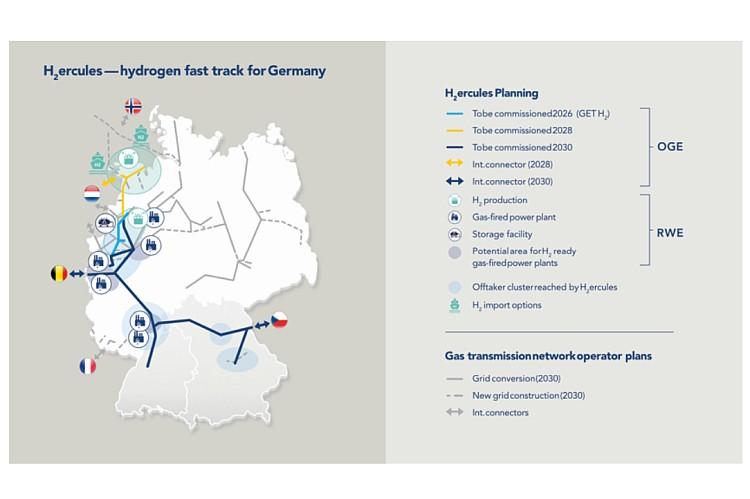OGE And RWE Building The Foundation For Germany's First Hydrogen Fast Track: H2ercules

Open Grid Europe (OGE) and Rheinisch-Westfälisches Elektrizitätswerk Aktiengesellschaft (RWE), German powerhouses in the transmission and production of energy respectively, are teaming up to lead Germany and the rest of Europe (if not the world) in the development of a new hydrogen industry and infrastructure dubbed H2ercules.
In its press release, OGE says the infrastructure is set to connect electrolysers as well as storage and import facilities in the north of the country with industrial consumers in the west and south of Germany. Additional import routes from the south and east that are currently under development are to be connected by 2030. H2ercules is thus set to become the backbone of a hydrogen infrastructure linking the North Sea coast with southern Germany. Other large companies, such as ThyssenKrupp, have signalled their interest in being connected to such a grid.
While such a plan will invariably entail high costs, as natural gas pipelines can and will be repurposed for hydrogen, such costs will be mitigated. Along these lines it is estimated that investments of about €3.5 billion will be needed to implement the project. Thus existing natural gas pipelines will carry the load, allowing the proposal to be implemented more quickly and more cost-effectively overall than infrastructure that is constructed from scratch.
Markus Krebber, CEO of RWE AG: “In order to achieve its climate goals, the industry needs large volumes of green hydrogen – as quickly as possible. RWE is thus planning to construct additional electrolyser capacities in the coastal regions of northwest Germany by 2030. The green hydrogen produced there is then to be transported from the north to the steelworks, chemical plants and refineries in the Ruhr area and southern Germany. Together with OGE we are addressing this challenge and we are planning to build Germany’s first hydrogen fast track.”
For his part, Dr Jörg Bergmann, Chairman of the Board of Management at OGE added: “The concept is to be seen as a proposal that can be implemented in order to solve the Herculean tasks of decarbonising and diversifying the energy supply. These tasks can only be mastered if companies collaborate across different levels of added value with the support of policymakers to quickly create suitable operating conditions. RWE as a leading power generation company and OGE as a leading company in transporting energy in its gaseous form combine the required expertise and will to shape the future of energy. We are overcoming the chicken-and-egg problem through this very big leap and can thus offer other hydrogen players a solid foundation for their projects.”
The partners offer that the project is open for other partners to participate along the hydrogen value chain. With this integrated approach and an implementation path that is geared towards growth, H2ercules will be able to cover two thirds of the hydrogen demand from the German industrial centres along the recommended route by 2030 – a major step towards a large-scale hydrogen economy. In addition to industrial consumers, smaller companies may also benefit from the project.
Both OGE and RWE are in continuing talks with German and EU policymakers to ensure that the necessary political infrastructure is also in place for H2ercules' success.

